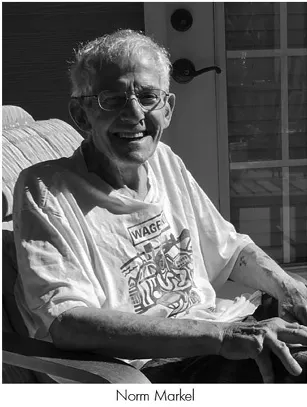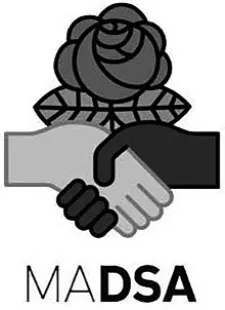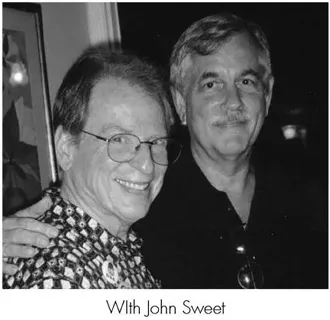![]()
Building Metro Atlanta DSA
After thirty-five years with Michigan AFSCME, I retired in 2001, a decision that came easily. My pension benefits were generous and would allow me to live comfortably during my retirement years. My wife, Linda Lieberman, and I could move to Atlanta and be near her two sons and their families, who were raising their families there. We would then take on the proper role of grandparents. In addition, we could trade in Detroit’s winter weather for the mild weather of the South. In our first year in Atlanta, we rented an apartment. The plan was to first scout out the Atlanta area before buying a home. A year later, we found a lovely home in Dunwoody located just outside Atlanta’s perimeter. What I could not anticipate was how the move to Atlanta would take me on a democratic socialist path, as exciting and rewarding as any experience I ever had as a movement activist.
Exploring and learning about the city of Atlanta’s geography was both interesting and challenging. I originally thought that my labor education experience would open some doors. I was prepared to teach classes in steward training, collective bargaining, and labor history at a college or union on a paid (or unpaid) basis. No such opportunities, though, became available. However, by attending the Atlanta North Georgia Labor Council, I developed relationships with council president Charlie Flemming and several other labor leaders.
I took advantage of the leisure time afforded me by working out at the Atlanta Jewish Community Center gym and entering table tennis tournaments—winning some trophies and securing a rating among Georgia table tennis players. But I was still looking for an activist community.
That search led me to the Howard Dean campaign and a Brit Tzedek Vshalom (Jewish Alliance for Justice and Peace) meeting where I met retired psychology professor and activist Norm Markel at a coffee shop in downtown Decatur. We became fast friends and comrades and shared a common history. Norm had grown up in Detroit and was active in the New Left during the sixties. As a psychology professor, he led a statewide American Federation of Teachers (AFT), organizing campaign at the University of Florida.
Starting Up Metro Atlanta Democratic Socialists of America (MADSA)
In 2005, I decided to attend the Democratic Socialists of America convention in Los Angeles. My two sons, Alex and Jonah, were living in the LA area, and I could then visit them as well. My participation in Detroit DSA’s past activities had made it possible for me to be chosen as a Detroit delegate to the convention. I had just written an article for the Detroit DSA newsletter detailing the recent splitting of the AFL-CIO into two competing labor federations. I had also spoken to the membership at a public forum on labor’s socialist heritage. While in Detroit, I provided continued support for their annual Douglass-Debs Dinner.
At the convention, much of the discussion focused on DSA’s main project for the coming year. DSA chapters publicly committed to organizing fundraising parties for Bernie Sanders’ senatorial campaign in Vermont. Since there was no DSA presence in the South, I felt compelled to volunteer my efforts to organize a fundraiser in Atlanta. That announcement was greeted with much enthusiasm by the delegates.
By becoming familiar with a broad range of progressive organizations—Atlanta North Georgia Labor Council, Jobs with Justice, 9 to 5, and the magazine Nation discussion group—I felt confident that interest existed in the progressive community for such an event to take place. After learning how to navigate Atlanta’s progressive community, I found it to be compact, connected, and manageable.
For the Bernie Sanders fundraiser, I decided first to use the list provided me by the national DSA office of members in the Atlanta area and reach out to them by phone. I would gauge their interest in forming a DSA chapter and additionally organizing a fundraiser, and I asked Norm Markel to join me in this project. His enthusiastic and positive response energized me. However, the responses to the phone calls were mixed. Some folks were already engaged in single-issue political work, while others were limited by age and health issues. Fortunately, enough interest was generated to schedule a meeting in January 2006. Ten people showed up, and most signed a petition requesting that the DSA National Political Committee grant us a charter. (Since fifteen signatures were required, we had to meet again before completing the petition.)
We formed a steering committee and drafted bylaws using language provided by the national office. The bylaws were approved at the next membership meeting and submitted to the national office. MADSA—Metro Atlanta DSA—was now an official DSA chapter.
The next task was to find volunteers to fill the four executive officer positions. I agreed to act as chair, and Norm Markel, membership secretary. Austin Wattles, who had been active with the previous Atlanta DSA chapter in the 1980s before it disbanded, took the position of treasurer. From the Nation discussion group, I recruited longtime Atlanta activist Barbara Joye to serve as recording secretary. Bob Wohlhueter volunteered to set up our website and serve as our webmaster.
Bernie for Senator
As a newly formed chapter, we were able to latch on to several preplanned activities—public forums featuring Barbara Ehrenreich and Cornel West. We also joined the April 1 Southeast March against the War in Iraq. At our monthly meetings, topics included single-payer health care, environmental justice, and immigrant rights. But we still needed to take on a project that would bring us to the attention of Atlanta’s progressive community, and a Bernie Sanders fundraiser offered us just such an opportunity.
John Sweet, labor attorney and former city council member, agreed to host the fundraising party with his wife Midge at their home—a regular gathering place for progressive activists. Two other community leaders agreed to cohost the event as well: Henry Kahn, a faculty member at the Emory School of Medicine, and Charlie Flemming, president of the Atlanta North Georgia Labor Council. We sent letters announcing the June 26, 2006, party; and we were able to secure from the Sanders’s campaign a list of five hundred Georgians who had contributed to the Sanders’s campaign—two thirds living in the Atlanta area.
The program for that day was a great success, despite a thunderstorm. Fifty people showed up. Frank Hamilton, formerly of the Weavers, along with his wife Mary, provided the entertainment, including a sing-along. Bernie Sanders called in during the party, and spoke passionately about providing universal health care and a living wage for everyone. When asked if he would come to Atlanta after his projected victory, he said he would.
The fundraiser netted $5,200 toward Bernie’s campaign. We followed up with thank-you letters announcing MADSA’s upcoming projects: planning for the upcoming Georgia Progressive Summit (GPS) and our chapter’s hosting of the national DSA convention in Atlanta in November. As well as raising money for the campaign, the event attracted many people who would become core members of MADSA in the future.
Coalition Activity
In the same year, MADSA chapter members became actively involved with the Georgia Progressive Summit. The goal of the summit was to build a broad statewide movement for progressive values and actions. MADSA members led workshops on community organizing, gentrification, single-payer health care, and reducing economic inequality.
The next major event held in Atlanta was the US Social Forum in June 2007, and MADSA members participated in the planning and organizing committees. Alice Lovelace, national lead staff organizer for the forum, spoke at a chapter meeting. DSA’s national staff promoted the event and led several workshops. I was on a panel that examined the US working class from differing socialist perspectives.
Thousands of people participated in events held in the Atlanta Civic Center, downtown hotels, and cultural centers throughout the city; and MADSA hosted a reception for DSA members at my wife Linda’s son and daughter-in-law’s home in Midtown.
MADSA also supported the work of the Georgia Peace and Justice Coalition in opposing the war in Iraq and joined the Coalition for a Peoples’ Agenda and the Grady Hospital Coalition.
Douglass-Debs Dinner
At the same time, following a visit by National Director Frank Llewellyn, DSA’s National Political Committee decided to hold the organization’s November 2007 biennial convention in Atlanta. MADSA was proud to be a host chapter of the DSA convention—the first one ever held in the South. Activities, in addition to the convention, included a walking tour for delegates in Downtown Atlanta commemorating the 1906 race riot, and a rally on economic justice featuring a presentation by labor activist and author Bill Fletcher.
Our chapter’s main responsibility, however, would be to plan the Friday, November 7 dinner program. Bernie Sanders had already agreed to be the keynote speaker, and with Bernie as a draw, we decided to make the event a fundraiser for MADSA as well: the first Atlanta Douglass-Debs dinner. We formed a dinner committee and contacted potential patrons.
The first Douglass-Debs dinner recognized North Georgia Labor Council president Charlie Flemming and US Social Forum organizer Alice Lovelace for their progressive community activism.
The dinner was a major success: more than 250 people attended, and Bernie Sanders delivered a rousing speech challenging activists to combat the attacks being waged against the middle and working class. This address, focusing on economic inequality and calling for single-payer health care, prefigured Occupy Wall Street and Sanders’s 2016 presidential campaign.
The first Douglass-Debs dinner secured a special niche in Atlanta’s progressive community. We, therefore, planned to hold this event annually as our major fundraiser, but also provided tickets for low-income people and students so nobody would be turned away.
For these events, keynote speakers with labor backgrounds were specifically sought out, solidifying our relationships with labor. Labor, in turn, supported MADSA by buying ads in our program book and booking tables for the dinner. The UAW, SEIU, CWA, Teamsters, Painters Union, Georgia State AFL-CIO, and Atlanta North Georgia Labor Council were reliable and generous patrons. Keynote speakers over the years included Bill Lucy (CBTU), Jose La Luz (AFSCME), Stewart Acuff (AFL-CIO), Larry Cohen (CWA), Bob King (UAW), and Stephen Lerner (SEIU). Other speakers included Elaine Bernard (Harvard Trade Union Program), Kim Bobo (Interfaith Worker Justice), Sarah Jaffe (labor journalist), and Congressman John Conyers of Michigan.
Activists honored reflected the full spectrum of Atlanta’s progressive community, including pastors Reverend Timothy McDonald (First Iconium Baptist Church) and Reverend Anthony Motley (Lindsey Street Baptist Church) and state elected officials Nan Orrock, Vincent Fort, and Tyrone Brooks. Also honored were leaders from 9 to 5, Rainbow Push, Teamsters union, Communications Workers of America, Georgia Peace and Justice Coalition, Task Force for the Homeless, Coaliti...



